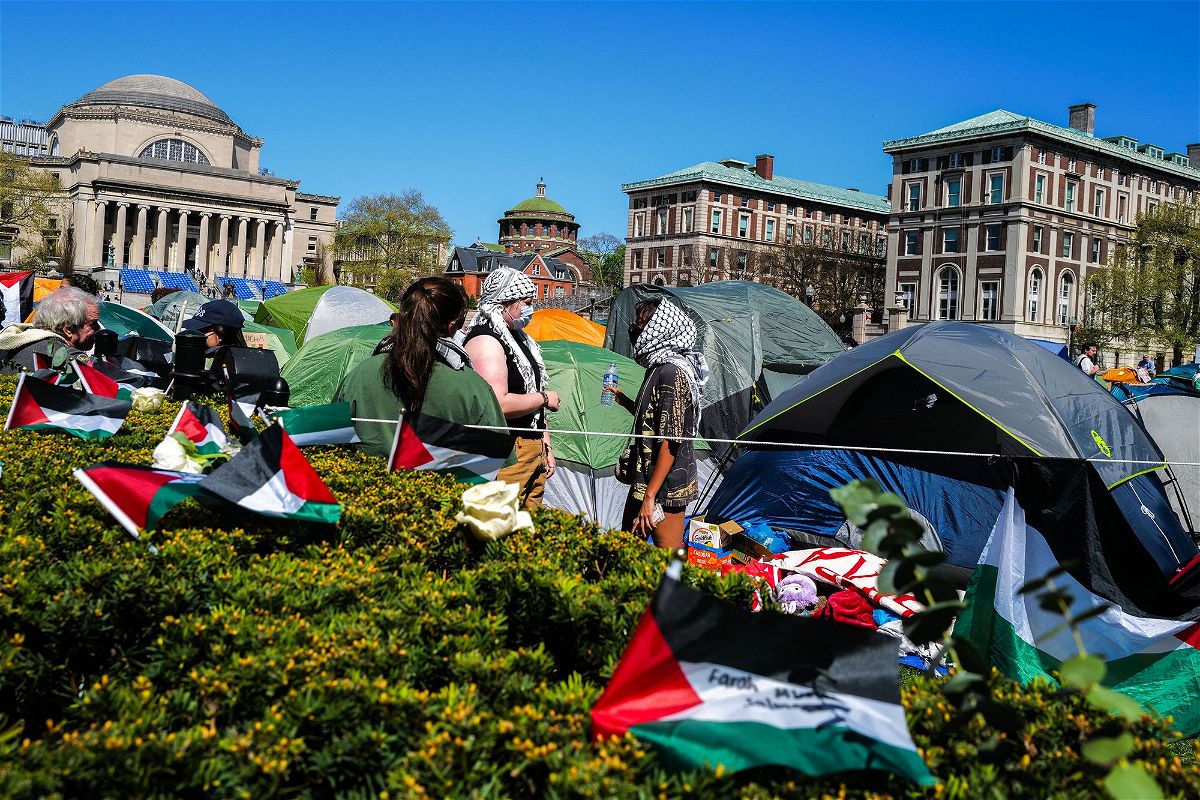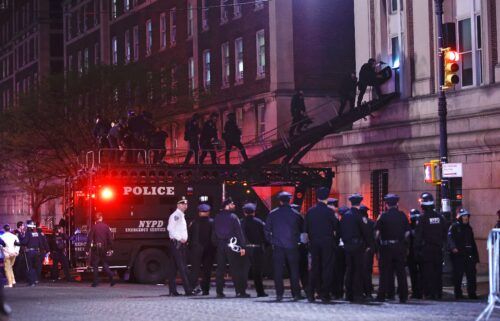Columbia University extends negotiations with student activists over dismantling encampment

Originally Published: 24 APR 24 00:01 ET
Updated: 24 APR 24 04:36 ET
By Ramishah Maruf, Samantha Delouya, Elizabeth Wolfe and Melissa Alonso, CNN
New York (CNN) — Columbia University said it has extended negotiations with student activists over the dismantling of the pro-Palestinian encampment that has cast its campus into days of turmoil, a spokesperson for the school said.
The statement came early Tuesday morning – just hours after Columbia’s president announced it had given protesters a midnight deadline to reach an agreement or the university would consider “alternative options” to clear the encampment. The talks will now be extended another 48 hours after “important progress” was made, the spokesperson said.
As the protests stretch into their eighth day, Columbia President Minouche Shafik has faced numerous calls from donors and lawmakers who believe police should be brought in to clear the encampment and restore order on campus – even as students and faculty are condemning the president’s similar decision last week to ask the New York Police Department to clear another student encampment.
Student organizers released a statement shortly after midnight saying their representatives left the negotiations Tuesday after the university threatened to call in police and the National Guard if protesters “do not acquiesce to their demands.”
Columbia did not comment on the claim when CNN asked for a response to the students’ statement.
More than 80 tents packed the lawn prior to the deadline late Tuesday night as hundreds of people buzzed in and around the encampment. The university said student protesters have “committed to dismantling and removing a significant number of tents” and agreed that people not affiliated with the university will leave the encampment.
Student activists “have taken steps to make the encampment welcome to all and have prohibited discriminatory or harassing language,” the university said.
Protesters have said they won’t disperse until the university agrees to cut ties with Israeli academic institutions and commits to a “complete divestment” of Columbia’s funds from entities connected to Israel, among other demands. But the editor-in-chief of Columbia’s student newspaper told CNN the negotiating parties seem to be struggling to find a middle ground.
“There seems to be very little room in terms of where the university wants to meet the students and the students want to meet with the university. It doesn’t seem that there’s much room in terms of compromise,” said Isabella Ramirez, editor-in-chief of the Columbia Spectator, Tuesday night.
Days of unrest on campus, as well as gatherings of non-student protesters outside the university’s gates, have led to safety concerns among Jewish students and prompted Columbia to move to mostly hybrid classes on its main campus for the rest of the semester.
“I fully support the importance of free speech, respect the right to demonstrate, and recognize that many of the protestors have gathered peacefully,” Shafik said in a release late Tuesday evening. “However, the encampment raises serious safety concerns, disrupts campus life, and has created a tense and at times hostile environment for many members of our community.”
Tensions are high, especially as Jewish students, faculty and staff celebrate the Passover holiday. Elected officials from the mayor of New York through President Joe Biden have commented, with leaders of the House of Representatives issuing statements on both sides of the aisle.
House Speaker Mike Johnson said he planned to visit Jewish students at Columbia on Wednesday and hold a press conference “regarding the troubling rise of virulent antisemitism on America’s college campuses,” according to his office.
As the national spotlight has fallen on Columbia, similar encampments are growing at other schools, and officials nationwide are grappling with a response to what has become a coast-to-coast disruption.
Almost a week after Columbia’s president came under fire from faculty and students for calling in the New York Police Department to clear out a pro-Palestinian encampment, arrests have occurredat other campuses across the United States as well. More than 100 students from Columbia University and Barnard College were arrestedlast Thursday. Barnard President Lisa Rosenbury confirmed in a statement Monday that students on interim suspension “no longer have access to most Barnard buildings.”
More 130 people were arrested at New York University at a pro-Palestinian protest Monday night. NYU said it asked for help from the NYPD after school officials said there were “intimidating chants and several antisemitic incidents” during a protest. That led to scenes of a chaotic confrontation between protesters and police in full riot gear. An NYPD official said the demonstrations weren’t violent overall, except for a few bottles thrown at police officers.
Yale University police arrested 45 protesters Monday and charged them with criminal trespassing after they refused orders to leave, said police in New Haven, Connecticut, though dozens of protesters remained Tuesday morning.
Other schools join in solidarity
Students across the United States have been protesting in solidarity with Gaza and suspended Columbia students this week.
Students, faculty and staff at the University of New Mexico peacefully protested Monday in support of Gaza, the university said in a statement Tuesday. Nine people were arrested Tuesday morning at the University of Minnesota’s Twin Cities campus after they formed an encampment that went against school policy.
Pro-Palestinian encampments have also been set up at the Massachusetts Institute of Technology, Emerson College, the University of California, Berkeley and the University of Michigan.
Harvard University has closed Harvard Yard and officials at the university suspended a pro-Palestinian student organization for allegedly violating school policies.
What it’s like at Columbia
Columbia students continue their encampment and have said they won’t leave until demands are met – a “complete divestment” from anything related to Israel, financial transparency into the university’s investments and amnesty from any disciplinary measures for students participating in the protests.
University officials warned earlier Tuesday that the encampment is violating school rules but did not provide specific disciplinary consequences. New York City Mayor Eric Adams said Tuesday authorities have identified “outside agitators” causing problems at the mostly peaceful student protests at Columbia, NYU and other schools in the city.
The encampment at Columbia University was lively early this week, with many students congregating in circles, eating and talking.
A group of Jewish and non-Jewish students gathered at the encampment to celebrate PassoverSeder Monday night. Columbia student Cameron Jones told CNN: “I am Jewish and, to me, Passover symbolizes perseverance and resilience. I think this encampment represents those two ideals because we have seen the university take countless measures to try to suppress our student activism, and here is us persevering through that.”
But some other Jewish students say they fear for their safety. Jacob Schmeltz, a senior at Columbia, told CNN he typically celebrated Passover on campus, but has chosen to go home for the holiday this year.
“Jewish students have had enough, and it’s gotten to the point that we feel safer off campus than on it,” he said.
In the national spotlight
As the protests stretch on, they have increasingly caught the attention of lawmakers. On Tuesday, the White House said that Biden was “of course aware” of the pro-Palestinian protests at college campuses across the country.
“We know that this is a painful moment for many communities, we respect that, and we support every American’s right to peacefully protest, that’s something that we have been consistent about,” White House Deputy Press Secretary Andrew Bates told reporters.
Bates also reiterated that the White House denounced calls for violence and antisemitic rhetoric.
House Minority Leader Hakeem Jeffries said Tuesday that the effort to crush antisemitism and hatred “is not a Democratic or Republican issue. It’s an American issue that should bind us all together.”
CNN’s Kate Sullivan, John Towfighi, Melanie Zanona, Taylor Romine, Omar Jimenez, Sara Smart, Matt Egan, Nic F. Anderson, Julia Jones and Isabel Rosales contributed to report.
The-CNN-Wire
™ & © 2024 Cable News Network, Inc., a Warner Bros. Discovery Company. All rights reserved.

